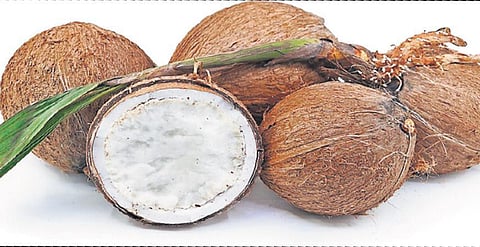

CHENNAI: It provides, protects, feeds and heals, and often even offers great Insta-worthy views. Its versatility is celebrated by most tropical denizens of the world. Can one ever tire of extolling the virtues of the coconut palm, often referred to as the Tree of Life? From the stem to the matured fruit, every part of the tree comes with a sacrificing and utilitarian quality. Its sustainability factor is something many of us urban dwellers showcase through our daily conveniences baskets, mats, desk decor etc. But what we mostly count on it for is its fortifying health benefits.
While coconuts are widely identified as a culinary ingredient and tender coconuts are available as a summer staple, a lesser-known part of the tree is the sprouted coconut. They can be categorised as foraged food because they are not cultivated but rather occur naturally in the wild, almost accidentally and often overlooked.
Available round the year, they are predominantly found in tropical countries and coastal belts around the world. Explaining its nature, Jagadeesan, a farmer, says, “A regular coconut harvested prematurely and purchased from a store will not sprout. These sprouted coconuts are naturally found on the ground beneath the tree, sometimes bearing a small root and a slender, green shoot. They are small to medium in size and oval or oblong. Once the coconuts have begun to sprout, they allow the seed inside the shell to consume the water and develop into a solid, spongy mass. Also known as coconut apple or embryo, these are typically ready for consumption one to four months after dropping from the tree.”
With the global market expansion and an increase in awareness, sprouted coconuts have witnessed a spike in popularity as street food. In India and Thailand, the coconuts are sliced open and are consumed fresh. In a few Asian islands, it’s sprinkled with salt and spice for added flavour, says home chef Kamala Kannan. Talking about its distinct taste and texture, she shares, “The spongy flesh has a very mild, sweet and savoury taste mixed with a tangy, subtle salinity reminiscent of the flavour of coconut water. Take a knife and go in a circle around the middle of the sprouted coconut until it cracks open. They are available in the summer on pushcarts. Vendors in T Nagar sell it at a minimum of Rs 40 depending on the size. They need to be consumed immediately.”
Recently, sprouted coconuts have been seeing a rise in demand in vegan and gourmet markets for their light, crisp texture, sweet and savoury flavour and nutritional value. Emphasising why it is the most nutritious part of the coconut when compared to the others, SI Dhivyaa Svarna, nutritionist and dietician, Fortis Hospital, Vadapalani, says, “The embryo absorbs all the nutrients from the water when it stays inside the husk. It has been incorporated into the everyday diet in many cultures for its medicinal properties for decades. You can add it to a salad, grind and use it in idli or dosa batter, prepare kheer, make jam, incorporate it as vegan mock meat and even eat it raw as a snack. Only recently many farms across the world have started naturally cultivating and shipping it across. It even has the potential to become a superfood.”
PACKED WITH BENEFITS
Treats bleeding disorders
Having coconut sprouts is beneficial when experiencing bleeding disorders such as nasal bleeding or the problem of heavy periods. The fatty acids in it help in creating, processing and eliminating progesterone and estrogen, hence balancing hormones.
Immunity and energy booster
An excellent source of vitamin C, they strengthen the immune system. Rich in omega-3 and omega-6 fatty acids.
Controls diabetes
Promotes and improves insulin secretion in your body and minimises the perilous health effects of diabetes to a large extent.
Treats urinary tract disorders
The diet for people suffering from urinary tract problems usually includes foods that can balance the acidic and alkaline elements in the body. Coconut sprouts are high in minerals. Helps in dissolving kidney stones. It also prevents vaginal discharge.
Good for digestion
Cleanses the digestive tract. The fibre content is favourable for digestion, gut health, and for a smooth bowel movement.
Low in calories
Satiates your appetite. The consumption of coconut embryos boosts your metabolic rate and also helps promote weight loss significantly.
Treats diarrhoea and dysentery
During summers, they help to cool down the body. It prevents dehydration. It’s advisable to take coconut sprouts when you have tummy problems such as diarrhoea or dysentery with bleeding caused by too much heat.
Lowers cholesterol
Improves good cholesterol and reduces the risk of blood clots and heart attacks.
Anti-ageing properties
It prevents the symptoms of premature ageing like wrinkles, age spots, fine lines and drooping skin.
Rich in vitamins and minerals
Rich source of vitamin C, vitamins B1, B3, B5, B6, potassium, phosphorus, calcium, iron etc. It comprises potassium to balance fluid levels within the body, iron to build the protein hemoglobin to transport oxygen through the blood, and lower amounts of copper and vitamin A.
Nutrient knowledge (per 10 g)
Carbohydrate 2 g
Fat 6 g
Protein: 1 g
Sugar 1 g
Dietary fibre 2 g
Source: SI Dhivyaa Svarna, nutritionist & dietician, Fortis Hospital, Vadapalani